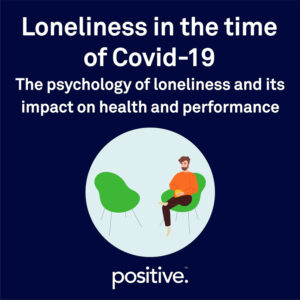For many, loneliness has been one of the most defining and challenging aspects of the pandemic. But how much does loneliness affect our physical health and psychological wellbeing? And how can we protect ourselves and our performance from the impact of loneliness in this virtual, socially-distanced world?
Loneliness was once assumed to affect almost exclusively older people, but research in recent years has shown it spans all age groups, affecting school children right through to senior executives. With social distancing creating new barriers between friends, family and colleagues, many of us are now feeling more isolated and lonely than ever before.
This is significant. Studies have shown that loneliness is associated with depression, impaired sleep, reduced cognitive function and reduced lifespan. Depending on circumstances, loneliness can be difficult to avoid, and with the ongoing pandemic, the challenges are particularly great. So what can we do? How can we take steps to prevent or reduce feelings of loneliness, both now and in the months to come?
In this webinar, taking place during Anti-Bullying Week, Positive experts Dr Sinéad Devine French and Will Marien will join leading light in the field of loneliness research, Dr Tim Matthews of King’s College London, to examine the nuances and common misconceptions around loneliness, and the role that we can play as colleagues, leaders, friends and family to help ourselves and each other through this difficult and disconnected time.






